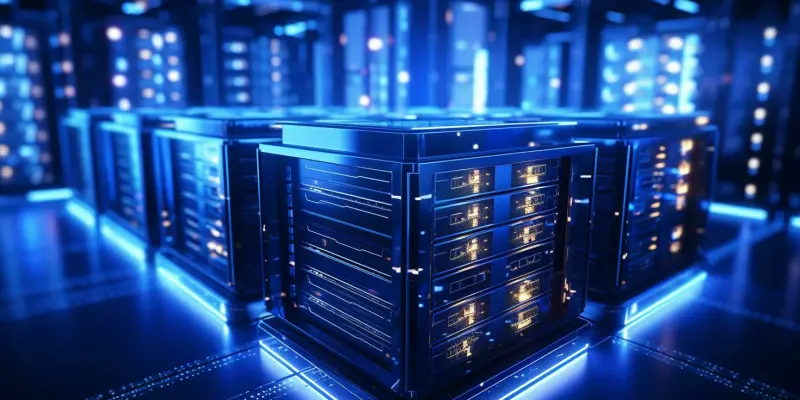In an era marked by intensifying environmental concerns, the integration of artificial intelligence (AI) in green data centers represents a significant step toward a sustainable future. As AI technologies continue to evolve, the demand for data-intensive applications is surging, consequently increasing the energy demands of data centers. This trend raises important questions about the environmental impact of data-driven innovation. Organizations across the globe are under pressure to curtail carbon footprints and adhere to Environmental, Social, and Governance (ESG) objectives, in part due to expanding regulatory mandates and increasing consumer expectations for sustainability. Notably, data centers currently contribute to approximately 1-2% of global greenhouse gas emissions, a figure that emphasizes the urgency for sustainable transformation in the sector. The intersection of AI and environmental sustainability in optimizing these data centers isn’t just a choice; it’s becoming a necessity for responsible technological growth and ecological accountability.
Balancing AI and Environmental Sustainability
The relationship between AI development and sustainable practices in data centers is multifaceted and evolving. As AI applications require substantial computational resources, the energy consumption associated with AI model training presents notable challenges to environmental sustainability. The burgeoning investment in AI technologies, fueled by a projected compound annual growth rate of 19.1% over the next couple of years, suggests that this issue will only intensify. Organizations are therefore tasked with the delicate balancing act of meeting AI performance demands while minimizing ecological impacts. To address these challenges, AI-powered energy management systems are being implemented in data centers to dynamically adjust power usage in response to real-time demand, facilitating greater operational efficiency. Through these systems, data centers can optimize energy consumption, achieving a crucial balance between technological advancement and eco-friendliness. This balance is essential as enterprises pursue ambitious carbon neutrality targets while striving to remain competitive in a data-driven global market.
Beyond energy management, structural changes in data center design are improving sustainability in the sector. High-density colocation strategies, which maximize space usage, are becoming increasingly popular as they significantly reduce both the physical and energy footprints of data centers. Additionally, innovations such as liquid cooling technologies are replacing traditional air-based systems, yielding major energy savings in cooling vast arrays of AI-driven workloads. These cooling solutions include air-assisted liquid cooling and rear door heat exchangers, which help data centers manage resource usage more efficiently and sustainably. By minimizing energy consumption in cooling processes, these advanced techniques not only cut costs but also align operational practices with environmental standards. Embracing such innovative approaches, data centers can effectively position themselves at the forefront of sustainable innovation, demonstrating that progress in AI can coexist with, and even drive, environmental stewardship.
AI-Driven Innovations in Data Center Sustainability
AI-based tools are transforming the energy efficiency landscape in data centers, offering unprecedented capabilities for optimizing resource utilization. By continuously scanning building management systems, AI can pinpoint inefficiencies, guiding improvements in infrastructure performance and energy consumption. Predictive maintenance is another AI-driven advancement that is reducing energy waste in data centers. Through advanced analytics, potential equipment failures can be identified before they occur, thereby reducing downtime and conserving energy that would otherwise be wasted. These techniques emphasize not only the ecological benefits but also the operational efficiencies gained from integrating AI into data center operations. Another promising development in the sector is the implementation of dynamic energy pricing models and on-site renewable energy microgrids. By capitalizing on solar and wind resources, data centers can create a self-sufficient energy system that significantly reduces reliance on non-renewable energy sources. These microgrids not only support the industry’s sustainability goals but also bolster resilience against energy market fluctuations and supply disruptions.
Furthermore, immersive 3D visualization and thermal optimization analytics powered by AI offer new insights into airflow and cooling inefficiencies within data centers. By simulating various cooling scenarios, these tools enable operators to optimize cooling systems and minimize energy expenditure in high-density environments. Each of these AI-driven initiatives is vital in decreasing cooling loads, enhancing overall energy efficiency, and supporting data centers’ legacy as pioneers of sustainable innovation within the tech industry. The implementation of these innovations signifies a move towards a future where data center operations are increasingly intelligent, autonomous, and environmentally aligned. Affirming the notion that AI is not only a catalyst for technological progress but also a critical enabler of a more sustainable operational ethos, the sector embodies a pivotal shift toward environmental responsibility.
The Sustainable Future of Data Centers
In an era defined by growing environmental concerns, integrating artificial intelligence (AI) into green data centers marks a pivotal stride toward a sustainable future. As AI continues to advance, there’s a swell in demand for data-heavy applications, driving up energy consumption in data centers. This shift prompts essential discussions on the ecological implications of data-driven innovations. Globally, organizations face mounting pressure to reduce their carbon footprint and comply with Environmental, Social, and Governance (ESG) standards. This is fueled by stricter regulations and heightened consumer expectations for green practices. Presently, data centers are responsible for roughly 1-2% of the world’s greenhouse gas emissions, highlighting the need for urgent sustainable changes in the sector. The fusion of AI and environmental responsibility to enhance data center operations is emerging as not merely an option but a fundamental necessity for conscientious technological progress and ecological stewardship.

